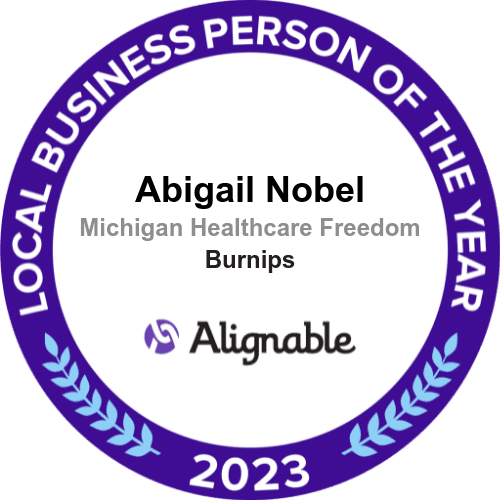
Dr. Megan D Steele, PhD, RN boldly declares truth about transgenderism in schools. A self-proclaimed "big mouth," she sources documented history, the Bible, and natural law, aka common sense.
See if her use of Mr. Rogers' clip in Podcast #2 doesn't make you smile. (Reposted because my first link didn't work.)
Dr. Steele is a wife, mother, Christian, and school nurse in Kansas. Her website and podcast are new and well-presented. If you know a school nurse, you should share this with them. Teachers and parents, too.
https://confessionsofaschoolnurse.com/
Her About Page tells more:
ABOUT ME
Dr. Megan D Steele, PhD, RN
Megan has not always taken the easy road in life. Becoming pregnant during her senior year of high school, Megan had to overcome many obstacles to become a successful nurse and educator. Megan is married to her husband, Matthew, and together they have five beautiful children. Megan is strong believer in the importance of faith, family, and liberty. She has a passion for education and providing student centered, ethical, evidence-based nursing care.
"Confessions of a School Nurse" emerged because Megan witnessed first hand the indoctrination of youth through the changing of classrooms and the changing of the medical field. Lies are being told to children and their parents and school nurses are seeing first hand the horrific damage occurring. It is time to confess the truth.
Speak the truth. Stand for the truth. Be the truth. The more you tell the truth, the stronger you will become and you will be filled with His amazing power, and that power will transform your life and the lives of your students.
This is where I stand:
1. I refuse to deny the importance and reality of biological sex.
2. I refuse to stand by while opportunistic boys take over women's sports and activities.
3. I refuse to stay silent about rules which violate women's privacy in bathrooms and locker rooms.
4. I refuse to revise a basic part of human speech to appease a sick subset of society.
5. I refuse to fund the mutilation of children's bodies through government programs or because of a parent's psychosis.
6. I refuse to be silenced in the face of a cancel culture which seeks to normalize and weaponize mental illness.
Deeper background from her nursing school faculty bio here. https://opsu.edu/spotlights/megan-steele/
Sometimes, we live in fear of offending people, of being attacked by the woke left, of being singled out if we say what we really believe. But living in fear is no life. And God's Word says, "There is no fear in love, but perfect love casts out fear." (I John 4:18)
Clearing away confusion, Answers in Genesis draws the necessary line that connects loving truth, with loving our neighbor.
The original article features an audio version and photos. I omitted them here for the sake of space.
https://answersingenesis.org/family/gender/gender-in-culture-cutting-through-chaos/
Gender in our Culture—Cutting Through the Chaos
by Dr. Owen Strachan on August 18, 2019; last featured June 13, 2023Editor’s note: This discussion contains terminology that may not be appropriate for sensitive readers and children. Parents are cautioned.
We’re used to disagreement. For example, hailing from Maine, I was raised from the cradle to cheer for the Boston Red Sox. As I ventured beyond New England, I discovered a strange species of humanity known as Yankees fans. I did my best to get along with them, but I freely admit that I am a work in progress on this matter. We all have these sorts of friendly disagreements—over teams, cuisine, vacation spots, Oxford commas, city ordinances, and on the list goes.
In 2019, [and even more so in 2023] this is where we find ourselves. No issue has more exposed our fundamental divide than that of transgenderism, the view that some people are born in the wrong body, essentially, and so must take action to bring out their true “gender identity.” Said differently, those who advocate the acceptance of transgender humanity believe that a girl can be trapped in a boy’s body—and vice versa—and thus should take steps to change their body so that it accurately reflects who they truly are.
This issue sneaked up on the church. We were accustomed to debates over creation and evolution, yes. We didn’t see that the debate over Genesis 1–3 (in particular) would jump from the earth’s age to human identity. Today, believers who believe in creation ex nihilo find themselves defending not only the historicity of creation but the historicity of humanity. The early chapters of Genesis, after all, teach us how the earth came to be and also how mankind came to be.
In an age like this, what should Christians do? More to the point: As debates over the nature of humanity rage, what should Christians say? Here are three basic points to guide believers who wish to speak the truth about the creative order and human design in a confused society and a rebellious age.
First: We Need to Know What the Bible Teaches about the Sexes
The first priority of God’s people should not be them. It should be us. By this I mean that we need to study Genesis 1–3 afresh. We need to go deep in the wise plan of God and see with renewed interest the intention of God for the human race.
The Lord made the man and the woman in his image (Genesis 1:26–27). You cannot pluck out a certain quality of humanity and identify that as the core characteristic of the image of God. The man and the woman are the image, in their totality, including their soul, rationality, relationality, and initial righteousness (see Paul’s words in 1 Corinthians 11:7).
The man and the woman are thus fully equal in terms of worth and dignity before God. But they do not have the same identity. The man is formed first and is made to work and watch over the garden (Genesis 2:15), while the woman is made from the man and named by him (Genesis 2:21–23). Here in the Genesis account, the Lord is signaling what Ephesians 5:22–33 will unfold in full detail: Adam is the head of his wife, Eve. He is called to love and lead her, and she is called to follow and submit to him. The marriage relationship, we learn in Paul’s teaching, is nothing less than a picture of the gospel love between Christ and his blood-bought church (Ephesians 5:25).
All this means that manhood and womanhood are divinely created realities. The sexes were not dreamed up by repressive authoritarians who wanted to institutionalize their domination of the weak. It is God who made manhood, and God who made womanhood.
In Genesis 2, the zoomed-in picture of the sixth day, it is God who forms the man from the earth’s dust, and God who forms the woman from the man’s rib (Genesis 2:7, 21–22). You could not get a more obvious statement from the Lord about the sexes: He made them. He sculpted them, works of beauty, just as he wanted them to be.
He not only created them a man and a woman, but he gave them specific roles and duties within the home. The man would need to provide and work and protect; the woman was designed with the capacity to nurture and bear life, an awe-inspiring ability if there ever was one. From this constitution, she sees the need not merely to keep a baby or child alive, but to love her home and children in a set-aside way (see Titus 2:5). All this God-glorifying work takes place in the context of marriage. It is not an art class project where we can put together the pieces however we see fit, but a divine institution grounded in the Master’s creative design.
The first man and first woman were not evolved from gases; they were designed to maximally honor God according to their distinctive body and constitution. Your body, we conclude, is not raw material that you manipulate to fit your perceived identity, whatever that may be.
All this speaks not merely to creation but created order. There is a structure and form and purpose behind the sexes. The first man and first woman were not evolved from gases; they were designed to honor God according to their distinctive body and constitution. Your body, we conclude, is not raw material that you manipulate to fit your perceived identity, whatever that may be. Your body’s form—either manly or womanly—is a message from God, telling you a key part of who you are and who you are to be by his grace.
Second: We Need to Make Clear Our Desire for All People to Flourish
The preceding ideal, where God ennobles our gender differences for his eternal glorious purposes, may sound good to you and me. (I certainly hope it does!) But we’re not in the days of Genesis 2, are we? We’re in a post-Genesis 3 world, a world where the real historical sin of Adam has tainted and damned us all. Why would anyone in this world be interested in God’s ideal?
Answer: We need to make clear that this ideal is designed for all people, even today, to flourish.
I’m not saying this will be easy, but we need both eyes open as we understand the people we’re talking to. We are born sinners without any coaching or instruction. The fall had all kinds of effects, but one of the chief effects is that people sin without fear and claim a sinful and unbiblical identity for themselves. This is true across the globe, yes, but the West seems to have entered a Romans 1 environment, where pagan thought has displaced even a biblical (or even distantly traditional) conception of humanity.
What do I mean here? I mean that people today do not see themselves as made by God. They believe that they are uncreated, unbound to the Lord, and unfettered by any moral decree. Without the Bible as their absolute authority, they may do as they wish; they use their body as they like; they worship the very world they live in, not the one who made it. In their minds, they may freely enter into homosexual and polysexual engagements without respect to any theological or ethical system, and they openly and proudly reject the wisdom of God seen in both nature and Scripture. Increasingly, our neighbor is not even vaguely religious in the Christian sense. The people around us live, act, think, and desire like pagans.
So what do we do? Do we angrily detach from our society? Do we hate people who hate God? Do we let fear of hostility and attack take hold of us? All of these responses may prove natural to our flesh, but these are not godly responses.
As followers of the Lord Jesus Christ, we have a higher call, a supernatural one (supra naturam, literally “above nature”). We are called to love those who reject God’s truth and God’s design. We want them to flourish. This does not mean affirming them in their sin (a tricky matter, to be sure, and more on that below). It does mean that we pray for them, that we seek to win them rather than shun them, and that we show kindness to them as we are able.
Our witness to people who are living in rebellion against God—whether by embracing a new “gender identity” or otherwise—is grounded in theological truth. We know who they are: they are image-bearers made by God for his glory. They are human. They will taste true freedom only when they obey God by divine grace, and they will know true happiness only when they submit to divine rule.
We thus seek to tell our neighbors the truth, making clear that we want them to flourish. But flourishing does not mean adopting a false view of the human identity; flourishing does not come when people affirm us in our fallenness. Flourishing means leaving sin behind and living according to God’s design.
Third: We Need to Contend in Public for Biblical Truth
As we communicate these truths and live in this grace-filled way, people may respond by telling us that they have a right to form their own identity. It is wrong, they may say, for anyone to shape anyone else’s understanding of themselves. This sort of response may also come with a demand that we use their preferred pronouns and affirm their chosen lifestyle.
In addition to what I’ve already laid out above, what should we do in these sticky circumstances? Let me list four shaping principles.
1. We need to make clear that society depends upon certain hard-and-fast realities.
It may sound great to choose your own gender, for example, but what does this choice mean, say, for public restrooms? Are we going to have five different restroom types for five different genders? Or 50 for 50? Or 1,000 for 1,000? This line of reasoning is logistically impossible to execute.
2. We need to show how biology is actually quite clear on these matters.
Dr. Georgia Purdom has laid out the biological issues elsewhere in this issue. Yes, a tiny fraction of the populace is born “intersex” (having ambiguous or both male and female genitalia), but the vast majority of people are either male or female. These distinctive sexual realities shape our lives. As just one measurable distinction, men have, on average, 1000% more testosterone than women.
3. We must consider the natural desire to be affirmed, which is truly the quest of our age.
Many “transgender” individuals seek public acceptance of their lifestyle, but in a way that goes beyond merely wanting inclusion. All too often, our culture’s conception of affirming one another means agreeing with one another.
Disagreement is seen as hostile and evil today. So Christians need to communicate to unsaved neighbors that we can disagree without hatred. In truth, everyone disagrees on something; the non-Christian who says we’re non-affirming disagrees with us, after all. In place of unbounded affirmation and agreement, it’s better to advocate for mutual respect when disagreements exist.
To extend the point: Christians like the bakery-owning Kleins in Oregon, the florist Barronelle Stutzman in Washington, and the wedding-cake designer Jack Phillips in Colorado have all suffered for their biblical ethics in recent days. They have all been denounced and hated for their “lack of love.” The irony is often lost on folks today, who fail to see that they are hateful in the name of love. When this happens, as it will, we should point out the inconsistency.
4. We need to use discretion and wisdom regarding pronouns and identity markers.
We know biblically that figures like Esther and Daniel not only had to work and live in pagan environments but had to take on false names connected to idolatry. People around us today voluntarily and happily do what was forced upon faithful men and women in Scripture.
On the other hand, we must never approve of sin while we engage with unbelievers, including those embracing a transgender identity. We should explicitly call them out of a life of lostness, graciously directing them to leave behind cross-dressing, false gender identity, and other trappings of a transgender lifestyle.
Are there situations at work when we may be required to refer to a person by a pronoun that does not match their birth sex? There likely will be. Will teachers face a choice between getting fired or using the “preferred pronoun” of a supposedly transgender child? Yes, I predict some will.
Is there a one-size-fits-all answer to these and other related predicaments? We must never compromise the gospel and biblical truth in our witness, but we also may face instances where we feel compelled to use the new name of “transgender” individuals. Whatever we decide to do, we should never affirm their lifestyle and broader identity.
Conceding to their new name is not our preference. But when you live in Babylon, as we increasingly do, you must recognize that there are some gray areas that stretch us and challenge us. In those circumstances, we should not shrug our shoulders as if the wisdom of God is of no account. We should, however, strive like Daniel and his friends to live faithfully in a pagan environment that fundamentally contrives to compromise our witness. And when necessary, like Daniel’s friends, we should stand firm when commanded to bow before an idol.
Truth and the Christian Witness
The debate over gender and gender identity waxes hot in our time. If we once thought it was tough to eat Thanksgiving dinner with fans of our rival sports team, it is much more difficult when we graciously decline to affirm a family member’s new “gender identity.” We may well face hatred for this decision, even though it is motivated by love. Christians may wonder if they have, in fact, lost their ability to witness by speaking and standing for truth, however winsome we try to be.
This is what we must remember in days ahead: speaking and living according to the truth isn’t part of Christian witness. Speaking and living according to the truth is Christian witness. If God’s Word and its holy doctrines are not front and center in our evangelism and engagement, then we’re just offering a spiritualized version of can-do self-help to the world.
We have so much to offer: we have Christ and his gospel. This transforming truth, in the final analysis, is why Christians participate in our turbulent cultural debate over gender. We bring not only the truth of God’s order and God’s good design, but the transformative power of God’s saving message.
Faced with a lost, confused, and rebellious world, God’s children have much that we can and should say. But above every other word we could speak, we extend hope to the sinner: a satisfying and permanent resolution to the greatest disagreement that divides us all.
Transgender 101: What Do All These New Words Mean?
Cisgender, agender, gender fluidity—the sexual revolution has created a host of bewildering terms to describe the struggle for people to reconcile their internal desires with their bodies. What should Christians do with this new vocabulary?
It can be overwhelming, especially if you’ve never heard these words before or experienced these struggles. It’s tempting to dismiss the new vocabulary as a postmodern attempt to restructure reality, rejecting both the Bible’s terminology and basic biology.
Christians know that the Bible provides the solution to humanity’s deepest needs, and we don’t need to change any aspect of its message or vocabulary. Our greatest responsibility is to understand how redemption in Jesus Christ fulfills God’s highest purpose for humanity and to know how to share this good news with others.
Yet God’s Word also calls us to reach people with sensitivity and understanding. A dismissive, uncaring attitude won’t help anyone.
Familiarity with modern terminology does not necessarily mean you accept these terms as descriptions of what should be. They simply allow you to talk accurately and sensitively about what people claim they are feeling.
The most important concept to understand is the attempt to distinguish between (a) the “sex” a person is born with (physical characteristics of a male or female) and (b) the “gender” a person identifies with (their “lived role” as man or woman or other).
Gender dysphoria is the general term to describe an individual’s discontent with the gender “imposed” at birth based on visible physical sex characteristics. (This is referred to as “assigned gender.”)
Individuals who are content with their sex and gender at birth are referred to as cisgender (cis- means “on this side of”). People who identify with a gender different from the one they were created with and had at birth are referred to as transgender (trans- means “on the other side of”).
These “other” identities can take many forms. Some individuals identify with different genders at different times (called gender fluidity) or no gender at all (called agendered). The possibilities—and the vocabulary to describe them—are seemingly endless.
Christians must recognize that some people really do experience this range of desires, and they will be offended if we deny the existence of those desires. We should be sympathetic and acknowledge that the issues are real, but then we need to point them to the deeper issues, which are covered in the Bible.
Ultimately, we should not follow the culture in separating sex from gender, which is really the crux of the issue. We don’t have to change the Bible’s vocabulary or apologize for what it says. God designed his Word so that it would communicate to all humans and clearly show them the way to be transformed into the full and satisfying humanity—designed as male or female from the beginning—that God provided for us through Jesus Christ.
Dr. Owen Strachan is Provost and Research Professor of Theology at Grace Bible Theological Seminary (GBTS). Before coming to GBTS, he served as Associate Professor of Christian Theology and Director of the Residency PhD Program at Midwestern Baptist Theological Seminary (MBTS).
Strachan has authored numerous books, including Reenchanting Humanity: A Theology of Mankind, The Pastor as Public Theologian: Reclaiming a Lost Vision (with Kevin Vanhoozer), and the recent Christianity and Wokeness: How the Social Justice Movement Is Hijacking the Gospel—and the Way to Stop it. Strachan is the former president of the Council on Biblical Manhood & Womanhood, the former director of The Center for Public Theology at MBTS, and he is the president of Reformanda Ministries.
He earned his PhD from Trinity Evangelical Divinity School, his MDiv from The Southern Baptist Theological Seminary, and his AB from Bowdoin College in Brunswick, Maine.
He is married and the father of three children.
David Kallman of the Kallman Legal Group on Michigan Schools' Policy Options for LGBT Issues
Interview by President Bill Johnson of Michigan's little-known resource for moral debates: The American Decency Association.
https://www.youtube.com/watch?v=17LDY_E2XU8
David Kallman received his Associate of Arts Degree from Schoolcraft Community College in Livonia, Michigan, in 1976 and his Bachelor of Arts Degree in Business Management from Northwood University in 1979. He then obtained his Juris Doctor Degree from Thomas M. Cooley Law School in Lansing, Michigan in 1982. In 2008, he was appointed unanimously by the Michigan Supreme Court to serve a three year term as a commissioner for the State Bar of Michigan. He was also an adjunct law professor for five years at Thomas M. Cooley Law School in Lansing, Michigan, teaching sports law. He is currently an adjunct law professor at Baker College, at the Jackson, Michigan campus, teaching torts and business law classes. He is also actively involved in his church and served for many years as president of the board of a local adoption agency. His success and experience in winning cases at every level benefits every client he represents. He works tirelessly on their behalf to achieve the best results for his clients.
Comments on the Youtube video add useful context too.
"First, do no harm" anyone?
Fox News helps break the barrier of silence over the harmful effects of transitioning children.
By Hannah Grossman , Ashley Carnahan Fox News
Published July 21, 2023 6:00am EDT | Updated July 21, 2023 11:28am EDTKobe discusses his journey and regrets about 'gender-affirming care' in the hopes others will not do the procedures.A young male, who formerly identified as a trans woman, who was castrated and became a "patient for life" as part of "gender-affirming care," wants to warn others not to follow in his footsteps. He discussed his story of resilience and learning to accept himself for who he is, for the first time, with Fox News Digital.
Kobe, whose name is being withheld for privacy reasons, had "checked every box for what they call atrans adolescent." He was always "effeminate" and loved pink and playing with Barbies. If he had never been exposed to gender ideology, he says he probably "would have just stayed a feminine boy. And there's nothing wrong with that."
"I felt unlovable as an effeminate man in society and everything. A feminine boy, actually. I was never a man, I'm trying to reclaim my manhood now and everything. It's hard. I have breasts, I have the hip development of a woman, because I started the estrogen young. I have no gonads. You know, it's hard. My skull never really masculinized."
Kobe, in retrospect, looks back at the medical interventions as a subconscious use of "self-harm." During his early teenage years, he was struggling with internalized homophobia. "I mean, I saw it as a way out of my homosexuality, if that makes any sense."
However, he didn't realize these truths until he had his surgery.
"I was like, 'Oh, wow, this is so great. I'm locked in my transition. . . . But then everything started to crack, and I couldn't ignore the complications," Kobe said. "I couldn't ignore that I mutilated myself pretty much with the permission of a psychiatrist. It's insane now, looking back. It's just self-harm, you know."
Kobe first encountered the idea of switching genders on YouTube.
"And I said, ‘Oh, you can do this.’ You know, I don't have to be a gay guy. I don't have to be an embarrassment. And all this horrible stuff that I thought about my homosexuality, and it was like a light bulb. It was like, ‘This is a way out,’" he said. "I thought it was."
Kobe told his parents that he was transgender at age 11. At 13, Kobe said thatolder trans people online instructed him, as well as other kids, to "play the suicide card" in order to get chemical interventions.
"I started using, like, ‘the suicide tactics,’ because that's what they are. That's what they tell us all to do. . . . I don't want to use the word ‘groom,’ but we are like taught. I guess the older trans people teach us to say that stuff to get the health care and everything. And I mean, there were times when I thought I was genuinely suicidal over gender dysphoria, but it was I think it was all just stuff that was in my head. I don't think I would have ever been suicidal about being biologically male if I had never been exposed to that stuff."
Kobe was started onpuberty blockersaround 13, and estrogen at 16, and later had castration surgery at 19.
"I was expecting it to help me help my mental health, and it didn't do anything. I just wasted so much time, and all I did really was become a medical patient for life," he said.
Kobe said his growth is "permanentlystunted" because of puberty blockers, and has chronic pain in his spine as well.
"I need to get checked for osteoporosis, because I do have a pretty severe back pain just going up the spinal cord," he shared.
Puberty blockers have been linked to issues with bone mineral density.
The blockers not only suppressed Kobe's development but according to him "suppresses your life," "your drive to do anything" and "your happiness."
"Ilost a lot of sexual function. I lost a lot of sensation down there," Kobe added about the hormone treatments. "The mental stuff was really bad, but also like joint pain. It was just something near all the time. I was, like, aching and hurting."
Regarding cross-sex hormones – estrogen – Kobe said it impacted his cognition. He becomes foggy in the middle of conversations. Even now that he has been off of it for a few months, he still feels those effects. During the interview, he apologized for losing his train of thought numerous times – attributing it to the estrogen he used to take.
"It was constant brain fog. I was psychotic at some point. A lot of men that I know who went through this hormone replacement therapy, it's the exact same thing for them. Estrogen just makes them snap."
Kobe also developed an eating disorder after taking the hormonal drugs because of the issues it caused on his metabolism.
"The way that your metabolism sinks when you go on drugs, it's insane. I had such a hard time maintaining the weight and everything. It led me toward some really dangerous eating disorder behaviors and everything, which I also don't think I would have ever gotten into if it wasn't for the trans stuff. And not being able to keep the weight off with the blockers and stuff like that."
He describes how his treating practitioners glamorized the idea of having surgery.
"The plan was always estrogen and then SRS (sex-reassignment surgery)," he said. SRS inverts male genitalia to create a neo-vagina, which must be dilated for the rest of a patient's life.
The letter approving the surgery said hormone replacement therapy was successful for him, and that Kobe was happier and mentally stable."None of it was true. I wasn't mentally stable. I hated myself. I wanted to die, and I just was constantly trying to become something that wasn't. And it was awful. It was dissociating, it was terrible. But . . . and I'm sorry that – the estrogen – I lost my train of thought . . . ."
The surgery was scheduled but had to be canceled because of an insurance issue. So, Kobe opted for anorchiectomy procedure– theremoval of the testes – as a "middle ground." At the time, he viewed testosterone as a "poison" for his body.
"That's how deluded my head was, that testosterone is poison, and it's damaging and everything," he said.
Kobe also recounts how he was told by medical professionals that the orchiectomy surgery would help him in the interim of getting SRS.
"It didn't. Now I'm just sterile, and I don't have an endocrine system, really. I mean, Ido, but it doesn't self-regulate and everything."
Without gonads, Kobe will have to take testosterone artificially for the rest of his life, which he started doing recently.
"Honestly, I feel alive again," he said about being on testosterone. "I feel energetic. I feel confident. I just, I feel great. And it just goes to show that cross-sex hormones are bad. They're just bad."He said that after getting the surgery, the area is still sore, and he experiences random sharp pains, especially when he is intimate. Kobe also described issues with urinating.
"I don't think it'll ever not be an issue," he said. "I made the decision. I accept that and everything. It's just something that I have to live with now."
"I know now that so many people end up taking their own lives after the surgery. And honestly, if they had allowed to invert my genitalia into what looked like a female genitalia, I don't think I would be here in a couple of years, honestly, because there's no undoing that."
Kobe had family acceptance and "passed" as a girl. However, after all the interventions, he was still unhappy.
"I lived in denial for a bit, and I think a lot of people do before they de-transition," he said. But then he took a step back and looked at the entire ideology.
"I just realized how insane it was. I mean, people were saying trans women get periods, [they] deserved to be in women's sports,women's locker roomswith their male genitalia just swinging out, that trans women deserve to be in women's prison and stuff. I just saw that the rights of trans people were overtaking the rights of women, actual women. And I just couldn't justify any of that," he said.
As for what he plans to do in the future, Kobe loves science. He intends to pursue a career where he can care for animals.
"I'll do biology, and then I'll go for a year for zoology or something like that. I really want to work with endangered species and stuff like that. It's just reconnecting with stuff that I used to enjoy before getting sucked into all of this. Because the time I lived as trans, I had no hobbies or interests – I had nothing, really. It was just becoming this caricature of a woman and everything that's based around that."
When asked about what he wants people to know about him, Kobe said, "I just want [people] to know that I am strong. I see myself as very strong for what I went through. I'm a pretty compassionate person. I do care about kids that are suffering with gender dysphoria and everything. And I think that they deserve help. But I don't think that that helps."
For any teachers, parents, or school staff trying to deal with the "furry" mania, check out her incisive podcast episode on the topic.
https://confessionsofaschoolnurse.com/f/episode-14---furry-friends
Returning to the school/ mental health arena, the 73-page Norway study called Smartphone Bans, Student Outcomes, and Mental Health, by Sara Abrahamsson.
Abstract
How smartphone usage affects well-being and learning among children and adolescents is a concern for schools, parents, and policymakers. Combining detailed administrative data with survey data on middle schools’ smartphone policies, together with an eventstudy design, I show that banning smartphones significantly decreases the health care take-up for psychological symptoms and diseases among girls. Post-ban bullying among
both genders decreases. Additionally, girls’ GPA improves, and their likelihood of attending an academic high school track increases. These effects are larger for girls from low socio-economic backgrounds. Hence, banning smartphones from school could be a low-cost policy tool to improve student outcomes.






